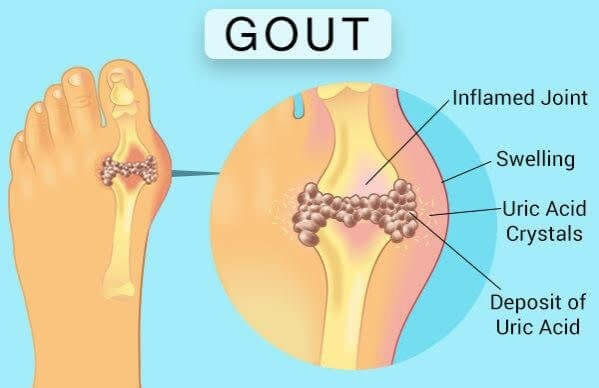GOUT Nursing Assignment Help | UrgentHomework
Introduction: Gout is another form of arthritis and the reason behind it is due to heavy amount of uric acid in the blood stream. Some sort of conditions such as metabolism disorder, dehydration can cause the deposition of uric acid in the blood. Kidney disease, thyroid disorder, inherited disease can even make the condition worse when the body wants to discard the excess uric acid. The following are some conditions for which someone can have the disease:
- Women after menopause condition or man of middle age.
- Having family history of gout.
- Having excess amount of purine rich food.
- Drinking alcohol.
- Having certain kind of medications.
L: The symptoms include:
- Acute joint pain (ankle, knees, elbows, wrists, fingers).
- Continuous discomforts.
- Swelling joints.

Diagnosis: The diagnosis generally based on the symptoms, physical examination, medical history and even the following points:
- Pain in joint and it’s intensity.
- The frequency of pain in joints.
- Redness of the affected area.
To check the level of uric acid the doctor needs to take a sample of fluid taken from the affected joints. The doctor may also recommend for X-ray, blood test, ultrasound.
Treatment: Gout treatment are mainly depends upon medical which can restrict the acute attacks and can prevent it.
- Nonsteroidalanti-inflammatorydrugs ( NSAIDs): Doctors prescribed it in a high dose to stop acute attacks and followed by small dose to restrict the attacks. The medications have the side effects like pain in stomach, ulcers, bleeding.
- Colchicine: It is a kind of pain reliever which reduce the intense pain effectively. But the high dose always have a side effects like nausea, vomiting, diarrhea.
- Corticosteroids: This can control pain as well as inflammation which comes in a pill form which can directly injected into the joints. Corticosteroids are for those patients who can’t take the above medications. But this has the side effects like mood swings, increasing blood sugar levels and blood pressure also.
- Medicationsthatblockuricacidlevel: This can help in reducing blood uric acid level and low down the risk of gout.
- Medications to improvetheuricacidremoval: The medications can enhance the ability of kidney to excrete the extra amount of uric acid from body.
Prevention:
- Restrict the alcohol intake and to drink a lot of fluid.
- Foods like sea foods, red meat, organ meat are not to be a part of food.
- Regular exercise, maintaining good health.
Nursing Topics
- Registered Nurses Standards For Practice
- Reflection on Registered Nurse Standards for Practice
- Ambulatory care Nursing Homework Assignments Help
- Australian Healthcare System assignment help
- Clinical Judgment and Decision Making in Nursing
- Critical Thinking In Nursing Homework Assignments Help
- Families in Sickness and Health assignment answers
- Healthcare Management assignment help
- Spiritual Needs Assessment answers
- Therapeutic Nursing Homework Assignments Help
- Anxiety Disorders
- Arrhythmia
- Arthroplasty
- Autism
- Zika Virus
- Glaucoma
- Gallbladder and Biliary disease
- GERD
- GOUT
- Colorectal cancer
- Hepatitis B
- Hepatitis C
- Heart failure
- Hodgkin’s disease
- HPV and cervical cancer
- Hypertension
- Hypogonadism
- Immunization
- Infertility
- Inflammatory bowel disease
- Insulin Therapy
- Influenza
⯈ Child Nursing Help
- Benefits of pet therapy in children on the autism disorder spectrum
- The use of cough and cold medicines in very young children
- Improving asthma management in schools
- Does obesity in children cause risks for influenza complications?
- Management of pain in pediatric nursing
- Children's health insurance: a right or a privilege?
⯈ Adult Nursing Help
- Effects of abdominal massage in critically ill patients
- Do whole grains in an adult's diet prevent cardiovascular diseases?
- Mirror therapy for brain-injured or stroke patients with partial paralysis
- The role of self-care management in sickle cell adult patients
- The role of nurses in weight loss programs for adults
- Cardiovascular risk scores in relation to age and gender
⯈ Elderly Care Nursing Help
- Ways to identify an abused elderly patient
- Clinical trials in older patients
- Change in health care for the elderly in your country
- Measures to take when the elderly refuse to eat
- Alcohol use among elderly patients in nursing homes
⯈ Women’s Health Nursing Help
- Acne prevention and treatment in women
- Increased risk factors for osteoporosis in women
- Factors that alter breast milk content
- Ways to teach patients about menopause management options
⯈ Pain Management Nursing Help
- Emerging ethical issues in pain management
- Influence of patient’s race and gender on pain management decisions
- Effects of cold therapy (a non-pharmacological method) for pain management
- Effective end-of-life care interventions
⯈Primary Health Care Nursing
- How well are nurses prepared for primary health care in your country?
- Primary health care: comparing public health nursing models in different countries
- Patient and family engagement in primary care

